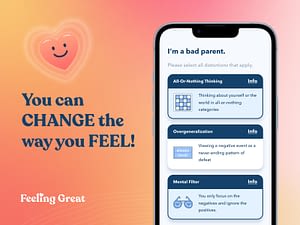#469 Ask David–
What if AI steals my job?
I’m freaking out!
Recently, I got a cool question from Megan Morrone, a technology and science editor at Axios. She asked about job anxiety due to fears of AI taking over our work. Initially, I declined to speculate, since I’ve never treated anxiety due to AI stealing someone’s job. But the more I thought about it, I realized I had quite a few, perhaps humble, things to say, so here it is, with help from Matt and Rhonda. I’ll include a link to her column at the end of these show notes.
She wrote: Dear Dr. Burns,
I’m a technology and science editor at Axios, working on a story about job anxiety and how it affects workers today.
Would have time to chat with me about it?
I’m hoping to schedule a brief phone or Zoom conversation before Tuesday. 15–20 minutes? We’d potentially discuss:
- Why job-related anxiety feels especially pervasive right now
- What strategies are most effective in managing it
- How CBT approaches can be applied in workplace or career contexts
Please let me know if you have availability.
Best,
Megan Morrone
She subsequently clarified her focus:
Hi! I’m looking at anxiety around AI stealing your job. Would you be able to speak to that? Any chance you’re Monday between 7:30AM-9:30AM Pacific or anytime after 12:30pm Pacific time? I’d only need 20-30 minutes and we can do it via phone or video call.
David’s response
Hi Megan,
I thought of one point I could make if it would further your cause. Every negative emotion has a healthy and an unhealthy version. For example, healthy fear—when you’re facing a realistic danger—is not the same as a panic attack or a phobia or social anxiety, etc. Healthy fear, or healthy sadness, and so forth, or not emotional problems needing treatment, but realistic emotions telling us to take action.
Sadly, with AI as the latest revolution, lots will change, some good, some bad. And sadly, many will lose their work due to being taken over by AI. Our son, for example, used to get high paid work anytime he wanted in user interface work for companies with prominent web presences. But now AI does all of that, apparently. So, he has to look for something entirely different, and he’s tried a lot. With a wife and a baby, the financial issues are real.
Now, if someone starts getting overwhelmed by feelings of anxiety, self-criticism, and inadequacy, and hopelessness, that IS something I can help with—big time, Bu the practical problems in finding new and different work will remain even after the person has regained self-esteem and optimism.
So sometimes scrambling and being flexible, if possible, and getting coaching with an expert in jobs and career development, perhaps, on what might be practically possible, is called for, and not psychotherapy. I LOVE working with anxiety and can usually guide my patients to extremely rapid recovery, which is tremendously rewarding, for them and for me! But when the problem is real, my expertise does not match the needs.
Hope this helps in some small way. Of course, sometimes a good shrink can help with sorting out options in the real world, but that generally requires a different type of specialized training.
It is profoundly sad, and we have personally experienced it, that so many people are facing this tragic uncertainty and worry about making ends meet and finding themselves lost due to this overwhelming and unpredictable new revolution.
For what it’s worth, my book, when Panic Attacks, is a mass market paperback that has helped many anxiety sufferers and illustrate a great many methods. Also, our Feeling Great app is currently free of charge and causes dramatic reductions in anxiety, depression, and a host of other negative emotions in less than 90 minutes the first time people sit down and use it. It actually includes a highly trained AI designed to use the exact methods I use in my work, and our data suggests that it vastly outperforms most human therapists but will probably not replace them because some serious problems require human intervention.
Best, david
David responds to Megan a bit further
Wonderful, I had one or two additional thoughts for you. People faced with layoffs due to AI (or any reason) face two challenges: the inner challenge and the outer challenge. The outer challenge involves finding, of course, some new way to work and support yourself and your family. The inner challenge has to do with your thoughts. One of the Self-Defeating Beliefs behind a great deal of depression and anxiety is the Achievement Addiction, which means measuring your self-worth based on your work, your achievements, and so forth. This goes back to the Calvinist work ethic, as you know, which is one of the cornerstones of western civilization: you ARE what you DO. So if you do good things, you are a good person; but if you are not doing anything productive or constructive, you are worthless.
So it is super easy to fall into a pattern of self-critical (and distorted) negative thoughts when you lose your work, including “I’m worthless,” and “I’m letting my family down,” and “this is my fault,” or “it’s unfair,” and endless varieties of these themes that can trigger immediate depression, anxiety, shame, inadequacy, hopelessness, anger, and more. So that is the inner battle. And that’s where good psychotherapy CAN play a hugely important role, so you don’t have to double your trouble and face a loss of your job plus the loss of your self-esteem and dignity at the same time.
Thanks, and good luck with your article!
Warmly, david
We discussed a great deal more on the live podcast. Megan just emailed me again, and here’s what she said:
You’re way ahead of me! The story hasn’t been published yet. But you can plug our Axios AI+ newsletter
https://www.axios.com/signup/ai-plus
So, check it out!
And thanks for listening today!
Matt, Rhonda, and David
Contact information
David and Rhonda are super impressed with Dr. Matt May’s therapy skills and ability to trigger rapid recoveries using TEAM. You can contact him at: https://www.matthewmaymd.com/
Dr. Rhonda Barovsky is a Level 5 Certified TEAM-CBT therapist and trainer and specializes in the treatment of trauma, anxiety, depression, and relationship problems. Check out her website: www.feelinggreattherapycenter.com.
You can reach Dr. Burns at david@feelinggood.com.
Feeling down in these turbulent times? Take a ride on our Feeling Great app.
Feeling Great feels wonderful!
You owe it to yourself to feel GREAT!
And Hey, did you hear?
It’s totally FREE FREE FREE all summer!
Jump on this offer and share it with friends who might be hurting!
Give the Greatest Gifts of ALL–Love and Happiness!



